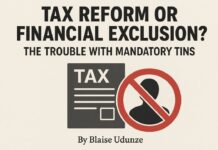The African banking sector faces a mixed outlook in 2025, as Fitch Ratings highlights challenges from sovereign debt distress, inflation, and fluctuating commodity prices. However, NIYI JACOBS writes on opportunities from reduced interest rates, stable exchange rates, and lending growth offer hope. Resilience through reforms and operational efficiency remains crucial for navigating the uncertainties ahead.
The year 2025 is poised to be a pivotal one for African banks, as Fitch Ratings’ African Banks Outlook 2025 paints a picture of both significant challenges and emerging opportunities. The report underscores the vulnerability of the sector to global and domestic economic pressures, while also pointing to areas of resilience that could drive growth amid adversity.
According to Fitch, African banks are heavily exposed to fluctuating commodity prices, which remain a cornerstone of many African economies. A potential decline in these prices could threaten the stability of banks, particularly in nations heavily reliant on resource exports. The effects of high inflation and elevated interest rates are also expected to strain asset quality, with businesses and households facing increased financial pressure.
The report highlights impaired loan ratios as a critical concern. While a modest improvement in these ratios is anticipated due to declining interest rates and stabilized inflation, the risk remains substantial. Furthermore, the ongoing sovereign debt distress in many African countries compounds the challenges. With an average sovereign rating of ‘B,’ the potential for contagion effects on the banking sector is significant, given the high debt-servicing burdens faced by several nations.
Despite the daunting risks, Fitch identifies several factors that could support the banking sector in 2025. Lower interest rates are expected to drive credit demand, while more stable exchange rates could bolster investor confidence and stimulate investment. These dynamics are likely to lead to lending growth, which, in turn, could help offset some of the pressures on banks’ asset quality.
Additionally, African banks continue to benefit from strong pre-impairment profits, bolstered by high interest rates, robust loan growth, and impressive non-interest income. Operational efficiency further strengthens their financial resilience, providing a cushion against potential losses.
The report dedicates significant attention to Nigeria, Africa’s largest economy. While Fitch commends the Tinubu administration’s commitment to orthodox economic policies, it also highlights critical challenges that could hinder the country’s recovery.
Economic Reforms and Investor Confidence
Fitch acknowledges recent reforms in Nigeria’s foreign exchange market, such as the introduction of an electronic matching platform for forex transactions. However, a lack of transparency continues to plague the system. The widening gap between official and parallel market exchange rates, coupled with lingering strains in the forex market, has slowed progress and eroded investor confidence.
The report further notes that Nigeria’s fiscal policy remains uncertain. The government’s 2025-2027 Medium-Term Expenditure Framework (MTEF) sets ambitious targets, including oil price projections of $75 per barrel and production levels of 2.06 million barrels per day. These assumptions exceed Fitch’s more conservative estimates of $70/bbl and 1.77 mbpd, casting doubt on the sustainability of the country’s fiscal trajectory.
Efforts to raise non-oil revenues are central to Nigeria’s reform agenda. However, Fitch warns that plans to increase the value-added tax (VAT) rate from 7.5% to 10% in 2025 may face political resistance, potentially stalling progress. Despite these efforts, Fitch projects that Nigeria’s general government revenue as a percentage of GDP will remain at a low 10.3% in 2024-2025, far below the 19% median for countries in the ‘B’ category.
The report emphasizes that improving revenue generation is crucial for Nigeria’s economic stability. Oil-related revenues are expected to fall short, making non-oil revenue mobilization even more critical. Yet, political challenges and inconsistent policy implementation threaten to derail these efforts.
Across the continent, sovereign debt distress poses a significant risk to African banks. High debt-servicing costs in many countries exacerbate the potential for contagion, with banks often holding substantial amounts of government securities. Fitch warns that lower interest rates could reduce yields on these securities, impacting the profitability of banks in countries already grappling with fiscal pressures.
Resilience Amid Challenges
Despite these headwinds, Fitch maintains that most African banks are equipped to navigate the challenges ahead. The report highlights the sector’s strong fundamentals, including robust pre-impairment profits and operational efficiency. In many cases, these factors provide a buffer against asset quality risks and economic uncertainties.
Fitch also underscores the potential for growth in lending activity, driven by declining interest rates and improved economic conditions. While challenges persist, these opportunities could help mitigate some of the pressures facing the sector.
As African banks prepare for 2025, the balance between risks and opportunities will shape their performance. For policymakers and financial institutions, the focus must remain on implementing reforms, improving transparency, and addressing structural vulnerabilities.
In Nigeria, this means accelerating efforts to mobilize non-oil revenues, enhancing fiscal discipline, and fostering investor confidence through consistent and well-communicated policies. Across the continent, managing the risks associated with sovereign debt and commodity price fluctuations will be critical.
Fitch’s report ultimately reflects a cautious optimism for the African banking sector. While the challenges are significant, the resilience of African banks and the potential for growth provide a foundation for navigating the uncertain road ahead.
This expanded version offers a deeper dive into the challenges and opportunities highlighted by Fitch, while contextualizing the issues within the broader economic and political landscape of Africa and Nigeria. It balances analytical insights with forward-looking considerations














